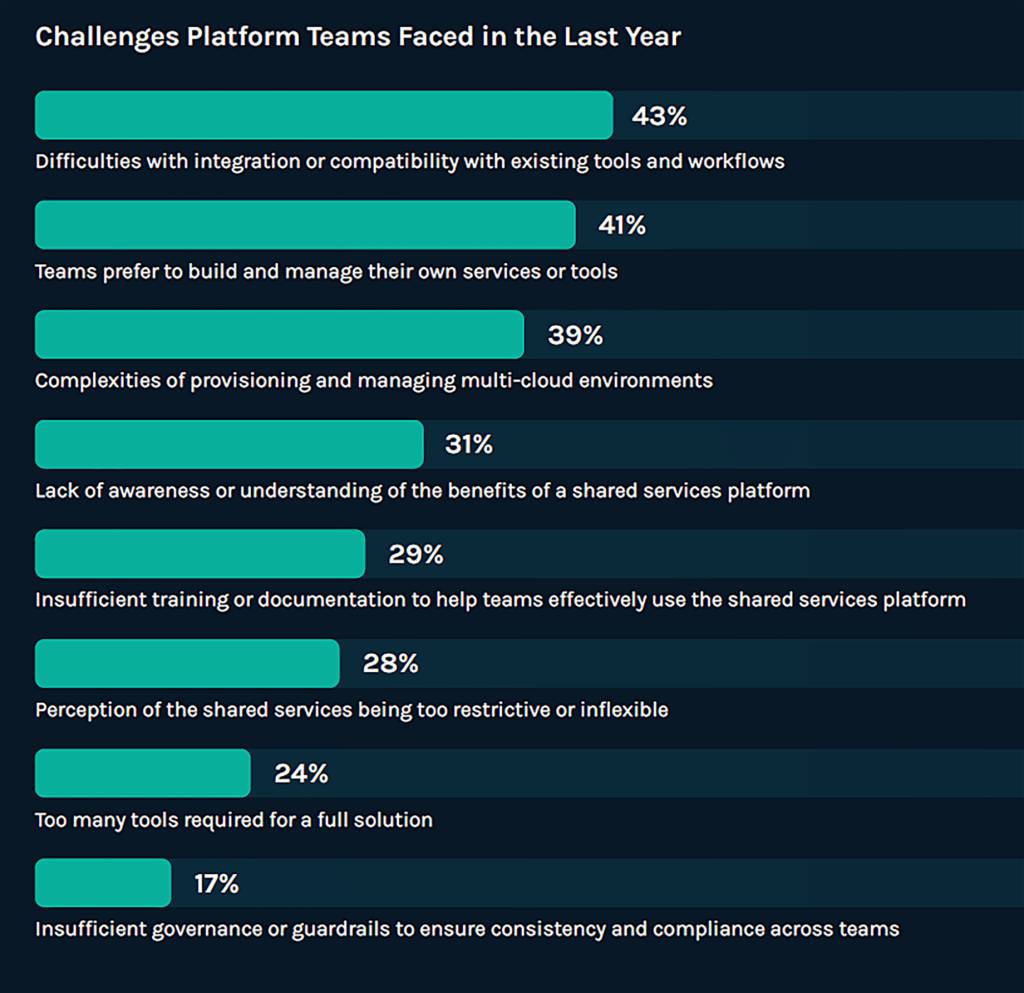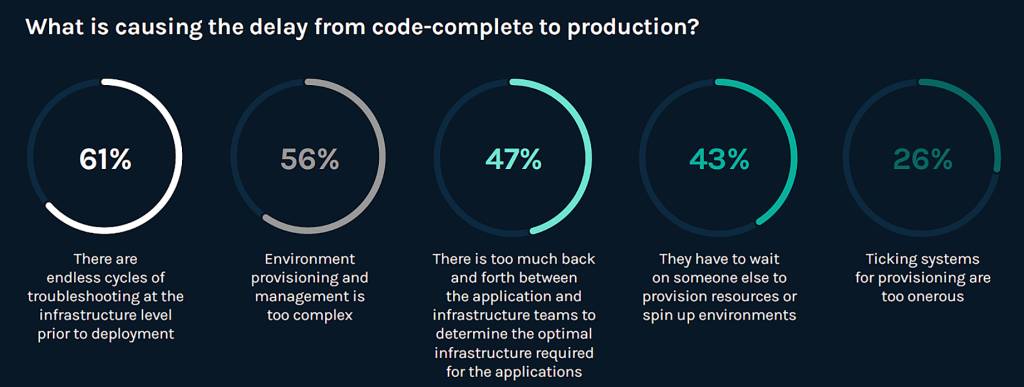包阅导读总结
1. 关键词:共享服务平台、平台团队、挑战、多云计算、自服务
2. 总结:周二报告指出共享服务平台被认为限制多且缺乏灵活性,平台团队面临多种挑战,如与现有工具和流程的兼容整合、多云计算环境管理复杂等,同时也指出平台团队有望增长,且未来将重视开发者自服务。
3. 主要内容:
– 共享服务平台
– 被认为限制多且不灵活,此观点成平台团队面临的首要挑战。
– 平台团队
– 被广泛采用,多数组织有平台工程团队或类似小组。
– 预期显著增长,人员和预算预计增长,但仅 47%有独立预算。
– 面临多种挑战,如与现有工具流程兼容、多云环境管理复杂、其他团队误解等。
– 环境配置
– 半数组织有平台团队致力于多云和混合云环境配置管理。
– 部署云应用服务慢,原因包括基础设施故障排查循环、环境配置管理复杂等。
– 开发者自服务
– 44%的调查计划未来一年优先考虑。
– 包括对 Kubernetes 集群配置等的自服务需求。
思维导图:
文章地址:https://thenewstack.io/are-shared-platforms-too-restrictive-a-new-report-says-yes/
文章来源:thenewstack.io
作者:Lawrence E Hecht
发布时间:2024/8/14 12:35
语言:英文
总字数:814字
预计阅读时间:4分钟
评分:89分
标签:平台工程,共享服务平台,多云管理,Kubernetes,自助服务开发
以下为原文内容
本内容来源于用户推荐转载,旨在分享知识与观点,如有侵权请联系删除 联系邮箱 media@ilingban.com
The belief that shared service platforms are too restrictive and inflexible is expected to be the top challenge facing platform teams, according to a report released Tuesday.
The perception has grown alongside increased acceptance of shared service platforms, reported the study by Rafay Systems. While only 28% thought this was a challenge last year, it is the top expected challenge, cited by 44% of respondents, platform teams will face in the next year.
The study also indicated widespread adoption of platform engineering. Seventy-one percent of the participants in the survey said their organization has a platform engineering team, while another 20% have an unofficial group that acts as a central platform team.
Platform teams are expecting significant growth, according to the report. Sixty-nine percent of organizations with platform teams expect that staffing for platform engineering will grow 25% or more over the next year. Almost as many (65%) expect at least a 25% growth in their platform budget over the next year. However, only 47% of platform teams have a budget that is separate from IT.
It is important to realize that platform teams are likely more prevalent among survey participants than among companies worldwide, due to the study’s sample.
The study’s participants were recruited through a third-party panel provider. All of them work in the U.S. for a company that has at least 1,000 employees and has experience with Kubernetes. Fifty-two percent had roles primarily dealing with IT/cloud, 15% focused on platforms, with the remainder holding development, DevOps and site reliability engineering (SRE) roles.
The report did not identify what budgets, teams or job roles will be negatively impacted by platform engineering trends. For example, will cloud and DevOps teams lose staffing as more workers join platform teams?
Platform Team Challenges
Platform teams themselves are facing a variety of challenges, with 43% of respondents noting difficulties with the compatibility and integration with existing tools and workflows. Furthermore, 39% said their organization’s platform team has been challenged by the complexities of provisioning and managing multicloud environments.
Beyond operational concerns, perceptions, and possibly misconceptions, about platform engineering continue to be roadblocks for platform teams.
Forty-one percent of the survey said platform teams are challenged by the fact that many other teams still prefer to build and manage their own services or tools. No wonder 31% believe that platform teams have been challenged by a lack of awareness or understanding of the benefits of a shared services platform.
However, it appears that there is a growing acceptance of the need for platform teams. Looking at possible challenges in the upcoming year, fewer believe they will include a preference to build independent services (35%) or a lack of awareness of shared platforms (26%).

Source: Rafay Systems’ “The Pulse of Enterprise Platform Teams: Cloud, Kubernetes and AI”
What Slows Down Environment Provisioning?
Multicloud and environment provisioning are unique concepts. Multicloud provisioning is about managing resources and user accounts across multiple clouds in order to improve scalability and flexibility. Meanwhile, environment provisioning deals with setting up and managing a single cloud environment to support application deployment.
Half of the survey their organization has a platform team working on an initiative related to multicloud and hybrid cloud environment provisioning and management. And as stated previously, multicloud environments can be complex to manage.
When asked about their developer and automation efforts, 28% said their organization has an initiative to automate environment provisioning and management. That’s less than the 40% building internal developer platforms and 45% focused on providing self-service experiences for developers.
Among the 28% who reported environment provisioning and management initiatives, Rafay found that:
- 82% said it takes at least a month to deploy a cloud application/service into production once the code has been completed and tested for quality assurance. That is much slower than desired, as 80% believe it should take less than a week to go from completed code to deployment.
- When asked what is causing delays in moving completed code into production, 61% mentioned endless cycles of troubleshooting at the infrastructure level, 56% noted the complexity of environment provisioning and management, and 46% the back-and-forth between application and infrastructure teams about infrastructure requirements.
- Lower on the list of delays were waiting for someone to provision or spin up environments (43%) and onerous ticketing systems for provisioning (26%).

Source: Rafay Systems’ “The Pulse of Enterprise Platform Teams: Cloud, Kubernetes and AI”
Self-Service for Developers
Looking forward, 44% of the survey plan to prioritize self-service for developers over the next year. Among those focused on self-service, the report found that:
- 65% want to enable self-service workflows for Kubernetes cluster provisioning.
- 60% want to enable self-service monitoring for applications (60%) and infrastructure (51%).
- 47% are prioritizing namespace as a service (47%) and self-service for environment provisioning (43%).
YOUTUBE.COM/THENEWSTACK
Tech moves fast, don’t miss an episode. Subscribe to our YouTubechannel to stream all our podcasts, interviews, demos, and more.
